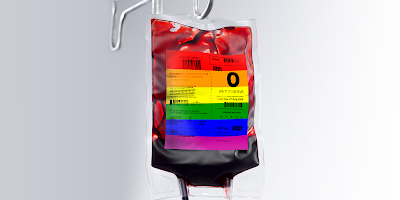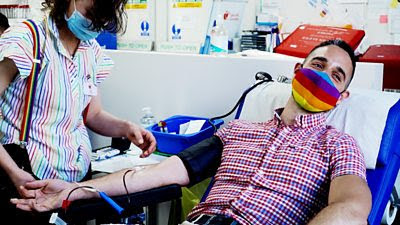This blog covers world political issues, mostly about LGBTQ news and rights, and other topics of my interest.
Tuesday, June 14, 2016
Discrimination barred gay men from donating blood to Orlando shooting victims
Thursday, April 28, 2022
Canada lifts restrictions on gay men's blood donations
Health Canada approved the request by Canadian Blood Services to end the policy that restricts homosexuals from donating blood for three months after engaging in gay sex. A move Prime Minister Justin Trudeau said was "good news for all Canadians" but had taken too long.
Trudeau said at a news conference the ban should have ended 10 to 15 years ago, but research proving it would not affect the safety of the blood supply had not been done by previous governments.
Trudeau also said his government spent C$5 million dollars on research into the safety aspects of changing the blood donation rules and multiple scientific reports showed the blood supply would continue to be safe.
The research said current risks of contracting HIV from the blood supply, with all samples tested, was estimated to be "very low," at 1 in 20.7 million.
The policy change marks a significant milestone toward a more inclusive blood donation system.
Trudeau announced Canada ending ban on gay men's blood donation, watch it below:
Thursday, August 19, 2021
Israel removes restrictions on gay men donating blood
Israel has lifted restrictions on blood donations by gay men, saying the longstanding limitation was discriminatory and denigrating, Israel´s health minister said.
Until now, men seeking to donate blood in Israel were asked whether they had same-sex relations in the past 12 months, a category that would disqualify them from giving. Now the questionnaire inquires whether a prospective donor has had "high risk sexual relations with a new partner or partners" in the past three months, using gender neutral wording.
Nitzan Horowitz, Israel's health minister, who himself is openly gay, told that the Health Ministry had "removed the denigrating and irrelevant questions" in questionnaires for blood donors, and that everyone would be treated equally regardless of sexual orientation.
"There´s no difference between one blood and the other. Discrimination against gays in donating blood is over", he said.
Earlier this year the U.K. eased restrictions on blood donations from gay and bisexual men, following a similar decision by the U.S. last year because of a drop in the nation´s blood supply.
Saturday, September 25, 2021
Restrictions for gay men to donate blood ended in Germany
Homosexual men can now donate blood more easily than before in Germany.
The German Medical Association and the Paul Ehrlich Institute responsible for the safety of blood products have updated the relevant guidelines.
Up until now it was the case that people with so-called sexual risk behavior could only donate blood if they stated that they had ended this risk behavior at least twelve months before the donation.
From a scientific point of view, what is known as risk behavior occurs, among other things, in men who have sex with other men. Heterosexual men and women who frequently change partners also belong to the risk group.
This period has now been reduced to four months, according to the new directive.
The fact that blood donations from people with sexual risk behavior is handled differently than donations from people who live in a stable partnership is justified in the opinion of the German Medical Association.
However, new studies have shown that a period of four months is sufficient to safely rule out possible infections. If the so-called sexual risk behavior was at least four months ago at the time of the donation, this would "not lead to an increase in the risk for the recipients of blood and blood products", according to the German Medical Association.
The scientists expressly do not assess sexual orientation precisely to avoid any appearance of discrimination.
Israel authorities recently decided the same.
Sunday, April 5, 2020
Restrictions on gay men donating blood relaxed amid COVID19 pandemic
Tuesday, January 11, 2022
Greece lifts ban on gay men donating blood
Greece has lifted a longstanding ban on blood donations from men who have sex with men in a historic move for the LGBTQ community. A ministerial decree has signed by Health Minister Thanos Plevris and his deputy, Mina Gaga.
The decree created a new form for people wishing to donate blood to complete, which removes homosexual acts from the list of things restricting someone from doing so.
Now, people can donate if they have had the same sexual partner for the last three months, meaning gay and bisexual men in sexually active and monogamous relationships can give blood for the first time.
The ban on blood donations from gay and bisexual men was first implemented in 1977. Many countries introduced blood donation controls in the wake of the HIV/Aids epidemic. Greece was one of the few countries that upheld the ban, until now.
Last year, several countries lifted this ban too, including U.S., Brazil, Germany, Israel and England, Scotland and Wales.
Friday, December 26, 2014
US FDA recommends end to ban on gay men donating blood
"Over the past several years, in collaboration with other government agencies, the FDA has carefully examined and considered the available scientific evidence relevant to its blood donor deferral policy", the statement read.
Friday, June 21, 2013
The American Medical Association Says No to the Lifetime Ban on Blood Donations for Gay Men
gathered in Chicago to discuss several issues
Thursday, May 14, 2020
The Supreme Court of Brazil lifts restrictions on gay men to donate blood
Tuesday, June 9, 2015
"Bad Blood" Parody
Sunday, July 31, 2016
France ends lifetime ban on gay blood donations
Friday, December 19, 2014
80 members of US Congress demand repeal of gay blood ban
80 Democrats in both the House and Senate have sent a letter demanding the repeal of a discriminatory and un-scientific decades-old ban on gay men giving blood.
Sunday, May 14, 2023
U.S. relaxes blood donation rules for gay and bisexual men
The United States has implemented changes to blood donation guidelines, allowing for more gay and bisexual men to give with fewer restrictions.
In the new guidelines by the Food and Drug Administration (FDA), gay and bisexual men in monogamous relationships can now donate blood in the US without having to refrain from sex.
“This policy eliminates time-based deferrals and screening questions specific to men who have sex with men (MSM),” writes the FDA.
These changes relax decades-old restrictions that were initially designed to protect blood supplies from HIV, removing the requirement for a generalised population of “MSM” to abstain from sex for a three-month period before donating.
Instead, the updated guidelines now ask all prospective donors, regardless of gender, orientation, or background, screening questions aimed at evaluating individual risk factors for HIV based on medical history, sexual activity, and other factors.
The best available scientific evidence shows there is no meaningful risk for gay and bisexual men to give blood.
Thursday, June 17, 2021
Gay and bisexual men can now donate blood in England, Scotland and Wales
Gay and bisexual men in England, Scotland, and Wales can now donate blood, plasma and platelets under certain circumstances, the National Health Service announced this week in a momentous shift in policy for most of the U.K.
From now on, gay and bisexual men in sexually active, monogamous relationships for at least three months can donate for the first time. The move reverses a policy that limited donor eligibility on perceived risks of contracting HIV/AIDs and other sexually transmitted infections.
Donor eligibility will now be based on each person's individual circumstances surrounding health, travel and sexual behaviors regardless of gender, according to the NHS. Potential donors will no longer be asked if they are a man who has had sex with another man, but they will be asked about recent sexual activity.
Therefore, anyone who has had the same sexual partner for the last three months can now donate blood in England, Scotland and Wales. This authorization is very exceptional, as in Europe it is only possible in Spain, Italy and Latvia, at present.
Sunday, January 29, 2023
Blood donations in the U.S. could be easier for gay and bisexual men
The United States Food and Drug Administration (FDA) has revealed new regulations for blood donations that will make it easier for gay and bisexual men.
The federal agency announced that it would be easing its rules concerning blood donation restrictions for queer men. The proposed rules would have allowed queer individuals in monogamous relationships to no longer stay abstinent for a year to give blood.
In addition to the proposed adjustment, the FDA announced that they would explore the idea of gay and bisexual men filling out a questionnaire related to their sexual history. The established donor questionnaire will be revised to ask all potential donors about their new or multiple sex partners in the past three months.
“This proposal is in line with policies in place in countries like the United Kingdom and Canada,” the federal agency said.
With the proposed regulations officially released, the federal agency will be open for public comment, which will last 60 days. After two months, the FDA will review all the submitted comments before finalising the final set of US-based regulations.
Important step, but the goal should be to eliminate all queer-focused regulations.
Thursday, November 13, 2014
Spanish Doctors say they've found a cure for HIV
Tuesday, January 4, 2022
Israel lifts surrogacy restrictions for LGBTQ people
Israeli male homosexual couples, single Israeli men and transgender individuals will be permitted to arrange surrogate pregnancies in the country, Health Minister Nitzan Horowitz announced. The new policy takes effect on January 11.
Following a ruling by the High Court of Justice, the Health Ministry issued a circular amending Israel’s surrogacy law to provide equal access to surrogate pregnancies “to any person in Israel.”
“Today, we are putting an end to years of injustice and discrimination,” Horowitz told. “A week from today, we will also give equal access to surrogacy in Israel to single men, future fathers, as well as male homosexual couples, actually to any individual".
The court ruling struck down discriminatory definitions in the existing law that excluded access to surrogacy to some men. The court ruled that the government has an obligation to provide the same surrogacy conditions to men as women.
The ruling means that anyone who is suffering fertility limitations of the kind and quality that can only be resolved through resort to a surrogacy process can do it in Israel. That will create full equality between women suffering from a medical problem and men.
Early 2021, Israel agreed that being trans is not a mental disorder, and also lifted restrictions on blood donations by gay men since August, saying the longstanding limitation was discriminatory. In fact, Israel is considered the most progressive country in the Mideast regarding LGBTQ rights.
Friday, October 24, 2014
Kiss me, Kill me... Needs You!
This project will only be funded if at least $100,000 is pledged
by Thu, Nov 6 2014 5:00 AM CEST.



































